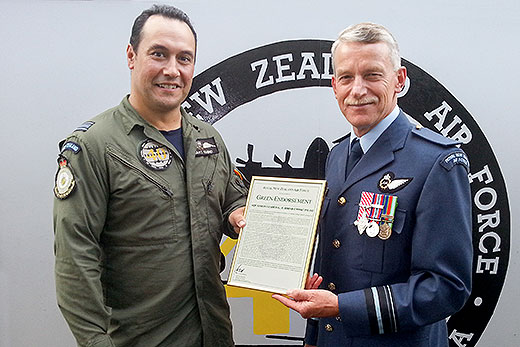The New Zealand Defence Force welcomes the findings of a Transport Accident Investigation Commission Report into the landing of a Royal New Zealand Air Force Boeing 757 in difficult weather conditions in Antarctica in October 2013.
Recommendations including risk assessment for future flights and meteorological minima are consistent with the RNZAF's own findings and have already been implemented.
Squadron Leader Grant Rhind receives a 'Green Endorsement' from the Chief of Air Force at the time, Air Vice-Marshal Peter Stockwell, for professional airmanship landing a Boeing 757 in difficult weather conditions in October 2013.
'We support the findings of the TAIC report which have confirmed that our operating procedures for Antarctic flights are robust and appropriate, and has revalidated the decision-making process by the crew for this flight,” says Chief of Air Force Air Vice-Marshal Mike Yardley.
'The findings are consistent with the investigation we carried out and the changes we made, following the landing, as part of our normal flight safety procedures. We've engaged actively and openly with the TAIC as they carried out their independent investigation, and it is pleasing that both investigations confirm the quality of the training provided to our personnel.”
Air Force support to the Antarctic Programme dates back to October 1965 and around 650 flights to Antarctica have been conducted by the Air Force since that time.
Air Vice-Marshal Yardley says, "Robust pre-season training is conducted for all RNZAF personnel involved in Antarctic operations, and the TAIC report shows that when the crew of the aircraft encountered rapidly deteriorating weather conditions, they followed the correct steps for a below meteorological minima landing, demonstrating considerable skill and professional airmanship appropriate to the situation.
'In particular, we've recognised aircraft captain Squadron Leader Grant Rhind with a ‘Green Endorsement' which recognises his sound decisions based upon the information available, his adherence to Defence Force Orders and Civil Aviation Authority regulations regarding actions to deal with situations of this type, and his skill and leadership on the day.
'The report confirms that the preparation and training given to Defence Force pilots and crews is world class, and that they are prepared for the situations that can arise in flight,”says Air Vice-Marshal Yardley.
The current Antarctic Programme season commenced in November 2014 and runs through to February 2015. The NZDF is providing 220 personnel including an operational light engineering team, personnel to offload the supply ship, drivers, fuel assistants, logistics staff and aircraft maintainers working with the US Air National Guard.



1 comment
good skills....
Posted on 31-01-2015 18:25 | By Jimmy Ehu
must have been some feat, getting something that size out of the air and on to ground safely, in those conditions.
Leave a Comment
You must be logged in to make a comment.